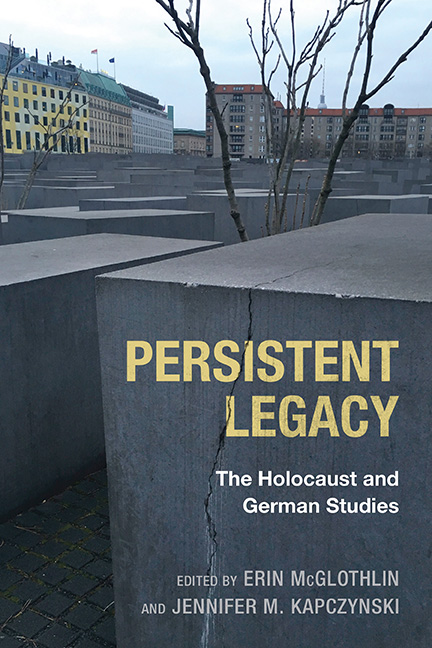Book contents
- Frontmatter
- Contents
- Acknowledgments
- Introduction
- Part I Abiding Challenges
- Part II The Holocaust in German Studies in the North American and the German Contexts
- Part III Disentangling “German,” “Jewish,” and “Holocaust” Memory
- Part IV Descendant Narratives of Survival and Perpetration
- Part V Remediated Icons of Memory
- Part VI Holocaust Memory in Post-Holocaust Traumas
- Notes on the Contributors
- Index
3 - Teaching Holocaust Memories as Part of “Germanistik”
Published online by Cambridge University Press: 17 June 2021
- Frontmatter
- Contents
- Acknowledgments
- Introduction
- Part I Abiding Challenges
- Part II The Holocaust in German Studies in the North American and the German Contexts
- Part III Disentangling “German,” “Jewish,” and “Holocaust” Memory
- Part IV Descendant Narratives of Survival and Perpetration
- Part V Remediated Icons of Memory
- Part VI Holocaust Memory in Post-Holocaust Traumas
- Notes on the Contributors
- Index
Summary
THE FOLLOWING ESSAY sketches out the specific premises of integrating the fact of the Holocaust into Germany's Germanistik, supplemented by some practical personal experiences. In the first part, I will take a closer look at a recent plea to universalize the Holocaust—Daniel Levy's and Nathan Sznaider's The Holocaust and the Memory in the Global Age, 2006)—and will demonstrate significant shortcomings that indicate the resistant specificity of Germany's reception of the Holocaust. In the second part, I illuminate some of the most virulent aspects that have made Germany a different ground for discussing and teaching Holocaust history, including the role of the German language in conceptualizing and implementing the Holocaust, the more recent modifications to Germany's self-image regarding the Holocaust, the change in students’ ethnic and cultural background, and the virulent history of Germanistik. Finally I take the Ludwig Strauss Professorship for European- Jewish Literary and Cultural History at Aachen University as an example of a current effort to integrate the Holocaust lastingly into the teaching of German studies.
The difference between Germany's Germanistik and the Anglo- American German studies should not be underestimated in this context. German Studies is not only much more informed by cultural studies than Germanistik, but the two disciplines also differ in their respective histories. Especially relevant for understanding the contemporary context is the traditional role of Germanistik in cofounding national self-consciousness, its involvement in the Nazi regime, and its positioning after 1945. To be sure, the greater the influence that cultural studies has had on traditional conceptions of Germanistik, the more one can speak of “German studies” in Germany. But this rapprochement between the two disciplinary inquiries should not persuade us to overlook the differences between them, which turn out to be most crucial in researching the dual character of the persistent legacy of the Holocaust.
I.
In their 2001 book Erinnerung im globalen Zeitalter: Der Holocaust (published in English as The Holocaust and Memory in the Global Age, 2006), Daniel Levy and Natan Sznaider account for “die Kosmopolitisierung der Holocausterinnerung” (the cosmopolitanization of Holocaust memories) that has occurred in the wake of the globalization process.
- Type
- Chapter
- Information
- Persistent LegacyThe Holocaust and German Studies, pp. 57 - 79Publisher: Boydell & BrewerPrint publication year: 2016

